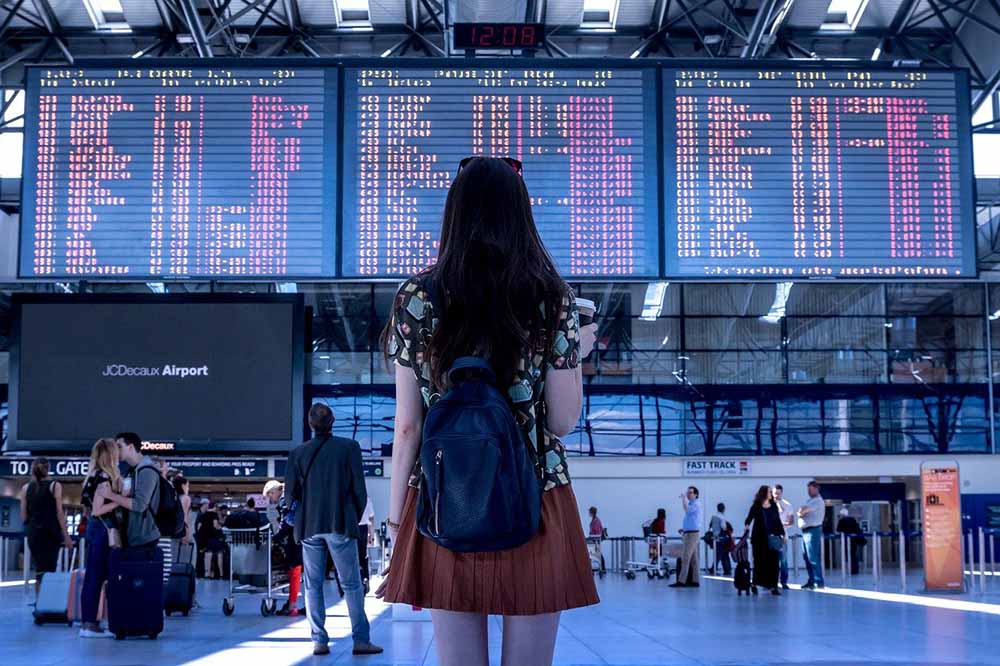
As more people work remotely, the concept of digital nomad has gained popularity. But traveling in different countries while working remotely can pose legal and logistical challenges.
This is why more and more countries set up digital nomad visas, which allow remote workers to live and work abroad for a limited period of time.
Let’s have a look at what a digital nomad visa is, the requirements to obtain one, and how to choose your perfect destination.
Before We Start – Who Are Digital Nomads?

Digital nomads are individuals who use technology to work remotely while traveling and living in different locations around the world.
They are often freelancers, entrepreneurs, or employees who can perform their job duties from anywhere as long as they have access to an internet connection.
Digital nomads enjoy the flexibility and freedom that remote work provides, allowing them to explore new cultures, meet new people, and experience different ways of life.
As the popularity of remote work continues to grow, so does the number of digital nomads around the world.
Types Of Digital Nomad Visas

There are several types of digital nomad visas available, each with their own unique set of requirements and benefits.
Some common types of digital nomad visas include:
- Simple Residence Permit: allows individuals to live in a country for a certain period of time without being able to work.
- Working Holiday Visa: allows individuals to work and travel in a foreign country for a specific period of time, usually one year.
- Startup Visa: allows entrepreneurs to establish a business in a foreign country and receive support from the local government.
- Tax Resident Status: allows individuals to work and pay taxes in a foreign country.
- Freelancer with local clients: allows individuals to work as a freelancer with local clients in a foreign country.
- Artist Visa: allows artists and performers to work and showcase their talent in a foreign country.
- Passive Income: allows individuals to live off passive income streams while living abroad.
How To Get A Digital Nomad Visa

To get a digital nomad visa, there are specific steps and requirements you need to follow:
- Look out for visa options: look into the various types of digital nomad visas available in your desired country.
- Check eligibility: ensure you meet the eligibility requirements for each visa.
- Gather all the necessary documents: collect all required papers, including proof of monthly income, health insurance, and criminal record checks.
- Apply for the visa: submit your visa application through the country’s embassy or consulate.
- Attend interviews: attend any required interviews or appointments as part of the visa application process.
- Follow up: keep in touch with the embassy or consulate to update on the status of your visa application.
Basic Digital Nomad Visa Requirements

Basic digital nomad visa requirements typically include proof of income, health insurance coverage, clean criminal record, and sometimes a minimum bank balance or language proficiency.
Here are the most frequent requirements asked by governments for their digital nomad visa application.
Minimum Income
Minimum income requirements are a common criterion for digital nomad visas.
Many countries require applicants to demonstrate that they have a stable source of income that can support their living expenses while abroad.
The minimum income can vary greatly depending on the country, ranging from a few thousand dollars to tens of thousands of dollars per year.
Some countries may also require proof of employment or freelance contracts, but most will accept bank statements or tax returns as evidence of income.
Proof of Remote Work
Applicants are often required to demonstrate that they are employed by a company or that they work as freelancers with clients outside of the country they plan to visit.
Some countries may require proof of a contract or letter from an employer, but most will accept a portfolio or website as evidence of remote work.
Keep In Mind – The purpose of this proof of remote work is to ensure that applicants are not taking jobs from locals and that they have a legitimate means of supporting themselves during their stay.
Passport
This requirement is asked by all countries, except if you’re a European citizen wishing to relocate to another European country.
All other countries require foreign visitors to have a valid passport in order to enter and stay in their territory. In addition to being valid, the passport should have sufficient pages for visas and an expiration date that extends beyond the intended stay.
Some countries may also require a certain amount of time remaining on the passport before it expires, usually 6 months.
Health Insurance
Health and travel insurance provides coverage for medical expenses, emergency medical evacuation, and other travel-related issues.
Some countries require applicants to have a minimum amount of coverage, while others may accept any type of health or travel insurance.
Bear in mind that having health or travel insurance not only meets the visa requirements but also provides peace of mind and protection while traveling and working abroad.
Clean Criminal Record
This one is a critical requirement to get an official digital nomad visa. Many countries require applicants to provide a criminal record check from their home country.
A criminal record may result in a visa application being denied or delayed, as it may indicate a risk to public safety or a likelihood of criminal activity while abroad.
Most countries that offer digital nomad visas won’t let you in if you have a criminal record.
Proof of Accommodation
To show proof of accommodation, you will have to show a rental agreement, a lease agreement, or a booking confirmation for a hotel or Airbnb.
Some countries may require you provide proof of accommodation for the entire duration of your stay, but most will only require a booking for the initial period.
The purpose of this requirement is to ensure that you have a safe and secure place to stay during your stay.
Minimum Bank Balance
Having a certain amount of money in your bank account shows that you have the financial means to support yourself during your stay.
The minimum bank balance amount can vary depending on the country. It is usually calculated based on the cost of living in the destination.
Some countries may require you to show bank statements or other financial records as proof of funds.
Language Proficiency
Some countries will want to make sure you’re able to communicate effectively with locals and understand the local culture.
The level of language proficiency required can vary depending on the country and may range from basic to advanced.
A few countries also ask applicants to pass a language proficiency test but most will accept a diploma or certificate.
Vaccination Records
In countries at risk in Africa or South America for example, you might have to prove that you have been vaccinated against certain diseases that may be prevalent.
They usually include diseases such as yellow fever, hepatitis A and B, Covid-19 or meningitis. Vaccination certificates or medical records are accepted by most countries.
Digital Nomad Visa Documents You Must Have

Here are some of the most common documents you will need to show if you wish to apply for a digital nomad visa:
- Valid passport: there is no living abroad without a valid passport ! The document should have sufficient pages for visas as well as an expiration date that extends beyond the intended stay, and sometimes for up to six months.
- Proof of monthly income: many countries with remote work visas require applicants to demonstrate that they have a stable source of income and that they can support their living expenses while abroad. You will usually have to show tax returns, bank statements or pay stubs.
- Health or travel insurance certificate: no matter which host country you choose, you will need to have a valid health insurance that will provide coverage for medical expenses and other travel-related issues.
- Clean criminal record: candidates are often required to provide a criminal record check from their home country. You can directly ask the local authorities to give you this document.
- Proof of accommodation document: some countries may require proof of where you plan to stay while living and working abroad. This can be a rental agreement, a lease agreement or a booking confirmation for a hotel.
- Vaccination records: some of the best countries for digital nomads will ask you to provide evidence of certain vaccinations or health screenings.
- Language proficiency certificate: depending on the country, you might need to demonstrate proficiency in the local language through a certificate or a diploma.
- Minimum bank balance: some countries may ask you to show proof of a minimum bank balance to cover living expenses while abroad.
Details about the Application Process

The process to apply for a digital nomad visa can be difficult and time-consuming, but with the right preparation, it can also be a smooth and straightforward task.
One of the first things to do when considering a digital nomad visa is to look out for the specific requirements of the country where you plan to apply. This can include eligibility criteria, necessary documents, application process…
Once you have determined that you meet the requirements for the digital nomad visa, you can start filling out the application form. Be sure to provide accurate and complete information on the form, as any errors or omissions can delay the process of your application.
Gathering all necessary documents is an important step of the application process. Some common documents that may be required are listed above. Have them all prepared before submitting your application, as missing or incomplete documents can result in delays or even rejection of your application.
Most countries apply a visa fee that you will need to pay either on the internet or on the phone, or by check.
Some countries will also ask you to attend an interview or provide biometric data as part of the application process. Prepare yourself before any interview or appointment!
Once you have submitted your application, the processing time varies depending on the country and the visa type. Be patient and follow up with the embassy or consulate to make sure your application is being reviewed as expected.
Do Digital Nomads Pay Tax and Where?

As a digital nomad, you may be required to pay tax in your country of origin, your country of residence, or both. It mainly depends on the destination you choose.
Every country applies their own tax laws and regulations. Look up for the tax laws in your country of origin and your host country and check how income tax, social security tax, and other taxes are applicable.
Your tax residency status (whether you’re considered as a tax resident in your home country, the country where they are physically present, or both) depends on your home country, your host country as well as the amount of time you spend in each country.
Most destinations around the world signed double taxation treaties, which will avoid you to pay taxes twice on the same income. These treaties can help determine which country has the primary right to tax your income.
Amongst the best tax residency digital nomad countries, you will find Estonia, where you can stay up to 183 days and pay no local income tax. Some other countries like Costa Rica also offer a one year tax exemption.
Digital Nomad Visa Cost Expectations
Every country applies its own digital nomad visa cost. The visa fee usually ranges from a few hundred dollars to several thousand dollars.
Some countries like Aruba apply no visa fee at all in the hope to attract more digital nomads, whereas other destinations such as Grenada or Dominica apply expensive digital nomad visa costs.
To the visa fees, you will have to add up some other expenses such as health insurance (depending on the required level of coverage), accommodation and general travel costs.
10 Digital Nomad Visa Countries You Should Consider

If you’re interested in discovering countries that are welcoming to digital nomads, be sure to check out our other guide Countries that offer digital nomad visas.
But here, we’ve put together a list of 10 countries that we think you should definitely consider:
- Barbados: Barbados is one of the best countries to live and work in in the Caribbean. Its affordable cost of living, fast internet and reasonable minimum income to apply ($50000 /47200 € per year) make it a great destination to extend your business while enjoying the wonders of the Caribbeans.
- Portugal: Portugal is one of the most popular destinations for digital nomads due to its low cost of living, its good climate and its fast internet connexion. Whether you wish to live in big cities such as Lisbon or Porto or to live by the sea and enjoy wonderful landscapes, Portugal has a lot to offer. Read more about the process of getting a Portugal digital nomad visa.
- Estonia: Even if Estonia’s weather isn’t the most enjoyable, you will love its digital nomad friendly environment. With a pretty low cost of living and a high quality of life, this is a great destination for digital nomads. The country applies a very favorable tax program for foreign business owners.
Read Next – Estonia Digital Nomad Visa Requirements
- Argentina: Argentina has recently launched its Digital Nomad visa which will allow you to stay in the country for up to one year. Remote workers enjoy its cost of living as well as its natural beauties and its friendly people. Argentina digital nomad visas are pretty easy to obtain.
- Germany: Germany is also a great digital nomad destination. Even if it’s not the cheapest destination in Europe, you will enjoy high-quality infrastructures, developed healthcare system, a vibrant culture, as well as many co-working spaces. Germany freelancer visa is valid for three months but can be converted into a residence permit.
- Cape Verde: if your dream is to apply for a digital nomad visa program in Africa, then Cape Verde digital nomad is probably your best option. Safe and secure, the country unveils amazing beaches and great landscapes. It’s also one of the cheapest destinations to work remotely and one of the most startup focused countries in Africa.
- Spain: if your goal is to really settle and join a solid digital nomad community, then you should consider applying to a digital nomad visa in Spain. The Spain visa for digital nomads will allow you to stay in the country for up to 5 years! The digital nomad visa application is cheap, and so is the cost of living!
- Mexico: Mexico has a warm climate, a rich culture, some of the most beautiful beaches on earth and a low cost of living. What else could you ask for? Definitely one of the best places on earth to work remotely! Our comprehensive Mexico digital nomad visa guide provides detailed information on the visa application process, offering you valuable insights and guidance.
- Latvia: if sun and heat are not important to you, then you might want to consider applying for a digital nomad visa in Latvia. This visa will allow you to reside and work in the country for up to two years. Latvia is well-known for its low cost of living and high standards of living.
- Costa Rica: Remote workers who are also nature lovers will love this digital nomads friendly destination. The digital nomad visa for Costa Rica will allow you to live and work in the country for up to one year. Costa Rica is clearly one of the best places on earth to work remotely if you like beautiful beaches, exotic wildlife and hiking.
7 Criteria on How To Choose the Perfect Country For You

- Cost of living: cost of living varies a lot from one country to another. Before you choose to send your digital nomad visa application, make sure to do some research about the cost of food, housing, transportation, etc. The lower the cost of living is and the more you’ll be able to enjoy your experience.
- Safety: as a traveler, you probably want to feel safe and secure in your surroundings. Before you start applying for your digital nomad visa, check crime rates, political stability, natural disasters and cultural norms and compare the results to those from your home country.
- Internet infrastructure: all remote workers need a stable and proficient internet connection to be able to pursue their activities. Check the average internet speed and the availability in the country or region you are considering. Make sure you will be able to work properly without spending hundreds of dollars on the internet each month.
- Climate: climate is an important criterion for most remote workers. Whether you like cold weather or heat and sunshine, make sure the country you’re planning to move to meets your preferences. You might also want to check other factors such as humidity, rainfall, seasonal changes and natural disasters.
- Time needed to get the visa: some countries deliver their digital nomad visas in a few days, while others will take several months before giving you an answer. Make sure to send your digital nomad visa application in advance so everything goes according to your plans.
- Cost of digital nomad visa: some visas for digital nomads cost a few dollars, while others are way more expensive and can exceed a thousand dollars. Make sure you know where you set foot before applying.
- Digital nomad visa validity: digital nomad visa validity varies from a few months to five years depending on the country you choose. Some digital visas can be extended, others can lead to a temporary residence permit, and others will allow you to apply for permanent residency.
Best Digital Nomad Visas Depending on Your Income & Locations

Finding the best place to relocate according to your income and personal preferences can be a daunting task.
Consider all the factors detailed above to find the perfect visa for your lifestyle.
Considering Your Income
- Monthly Income from $1000-$1500: consider a low budget destination. Countries such as Mexico, Thailand, Malaysia and Indonesia offer affordable cost of living and low visa fees. You won’t have any difficulty finding a budget-friendly accommodation or cheap food. Choose a cheap country to ensure that your monthly life will allow you to live comfortably.
- Monthly Income from $1500-$3000: consider a middle budget destination. Countries such as Costa Rica, Spain or Portugal offer a nice standard of living at a reasonable cost. Their digital nomad visa options are pretty wide and complete, and available at affordable fees. You can also choose a low budget destination to live even more comfortably.
- Monthly Income above $3000: with a high income, you will be able to choose almost all digital nomad visa countries. Popular destinations such as The Bahamas, Bermuda or Iceland might be an option, but you won’t be as comfortable as one of the low or middle budget destinations listed above.
Considering Your Desired Location
- Europe: Europe has a lot of success amongst digital nomads, thanks to its high standards of living. In countries such as Germany, Estonia, and Portugal, you will enjoy a great quality of life as well as affordable digital nomad visas. We would advise culture-intense cities such as Berlin, Barcelona or Riga so you won’t have a minute to get bored!
- Africa: Africa is a great destination if you’re looking for a new adventure. Countries like Cape Verde or Namibia will allow you to enjoy a low cost of living while spending your free time hiking or looking for wildlife. Unfortunately, not so many African countries have set up a digital nomad visa yet, but for now, you may consider applying for the South African digital nomad visa.
- America: if you like the sun, then you should consider countries such as Costa Rica, Mexico or Colombia, that have great digital nomad visa options as well as a very nice climate. If you’re looking for a more western destination, then Canada and the USA could be an option, although they don’t have any remote workers visa yet.
- Australia & Oceania: are you seeking to explore Australia and Oceania? Then you can consider options such as the Australia Work and Holiday Visa and the New Zealand Working Holiday Visa. Don’t forget to make sure the cost of living is balanced with your salary as Oceanian destinations are usually expensive.
- Asia: countries such as Turkey, Malaysia, Japan and Thailand offer affordable digital nomad visa options. In cities such as Tokyo, Seoul, and Taipei, you’ll enjoy a high quality of life and a thriving tech industry. Don’t forget to look out for political and economic stability before you choose your destination.
Considering from Where You Are Coming From
- From Europe: as a European citizen, some destinations will be easier for you. European destinations such as Portugal, Spain or Germany will be easy to reach. If you’re looking for an exotic experience, then you might want to become a digital nomad in countries such as Thailand, Mexico or Colombia.
- From Africa: African digital nomads who want to stay on their continent will probably love to live and work remotely in Cape Verde or Namibia, two African countries that offer visas for remote work. But if you want to try out a new way of life, don’t hesitate to apply for a remote work visa in Romania or Croatia!
- From America: if you’re American, there are plenty of attractive destinations you may consider. Estonia’s e-Residency program with its easy online business registration or Portugal’s affordable D7 visa and its tax incentives and low cost of living will be interesting. If you don’t want to live too far from your friends and family, you may also consider Mexico, Aruba and Barbados.
- From Asia: whether you want to stay in Asia or explore other continents, many countries will welcome you to work remotely. South Koreans can for example apply for a Working Holiday visa in New Zealand or Australia, which is ideal to work remotely and travel for up to a year. If you’re Malaysian and have a high income, then you can apply for a 10-year Long-Term Residency (LTR) Visa in Thailand, which has a low cost of living and beautiful beaches. Another great option is Japan with its Business Manager Visa.
- From Australia & Oceania: if you’re an Australian remote worker looking for an adventure, then you might want to consider great destinations to work remotely such as Bali in Indonesia, Taiwan or Mexico. For cold-lover digital nomads, Iceland and Canada are also great destinations.
Don’t Forget Health Insurance
When you’re a digital nomad on the go to live in another country, it’s quite easy to get caught up in the excitement. But there’s something you must not forget before you go explore a new destination: your health.
Heads Up! Many countries that offer an official digital nomad visa will ask for a health insurance certificate. This is to ensure you stay healthy and protected as you might get exposed to different environments, cultures, and health risks.
You never know when you might get sick or injured and, without any health insurance, medical bills can add up quickly, leaving you in a precarious financial situation. Having a full health insurance will give you peace of mind and important protection for your whole stay.
The Process If You Want Bring Your Family

Are you considering applying for a digital nomad visa with additional family member?
Some countries like Dubai make it super easy for digital nomad visa with extended family members! Their family or dependent visas allow spouse and children to accompany you thanks to their sponsorship program.
Of course, you will have to provide proof of relationship and gather all the necessary documents for each member of your family, but the process is pretty easy for many destinations such as Croatia, Barbados, Dominica and Costa Rica. They even offer special family visa fees.
The Pros Of Digital Nomad Visas
- Legal stay: Digital nomad visa will give you the legal right to live and work in a foreign country for a specific period.
- Financial benefits depend on the country: tax incentives, reduced cost of living, access to affordable health care, etc.
- Cultural immersion: digital nomad visa will allow you to meet locals and explore new and unknown places.
- Networking opportunities: meeting remote workers from all around the world
Be Aware Of the Disadvantages And Restrictions Of Digital Nomad Visas
- Isolation: moving to another country also means you don’t see your friends and family for a long period.
- Limited duration: visas are usually granted from 6 months to up to two years.
- Limited countries: not all countries offer a digital nomad visa.
- Financial requirements: some digital nomad visas require proof of financial stability with pretty high income.
The 6 Main Differences Between Digital Nomad Visa, A Tourist Visa And A Work Visa
| Digital Nomad Visa | Tourist Visa | Work Visa |
|---|---|---|
| Allows remote workers to legally work and live in a foreign country. | Allows tourists to travel to a foreign country for a short period for leisure. | Allows individuals to work in a foreign country for a specific employer or job. |
| Usually valid from six months to two years. | Usually valid for a few weeks to a few months. | Can be valid for several years or even permanently. |
| May require proof of income, health insurance, and criminal background checks. | Easy to obtain, no specific requirements. | May require sponsorship from an employer, a job offer, or specialized skills. |
| Provides more flexibility in terms of working hours and location. | Limited to tourist-related activities. | Limits the employer and job you can work for. |
| May have tax incentives or low-cost co-working spaces available. | No application | May have higher taxes and more strict regulations. |
| Can offer cultural immersion and networking opportunities. | Doesn’t allow cultural immersion or building professional networks. | Can offer stable employment and benefits. |
The 5 Most Common Reasons For Digital Nomad Visa Denial
- Incomplete paperwork: you absolutely have to fill out the visa application correctly and to provide all necessary documents. If any information is missing or incorrect, your application may be rejected.
- Criminal history: most countries perform background checks on visa applicants. If you have a criminal record, your visa application may be denied, especially if the crime is related to fraud, violence, or drugs.
- Insufficient funds: most countries require digital nomads to prove they have enough money to support themselves during their star. If you don’t fulfill the minimum income requirement or you don’t have enough money in your bank account, then this can result in a digital nomad visa denial.
- Overstaying a previous visa: if you have previously overstayed a visa or violated immigration laws in a country, your chances of getting a digital nomad visa are pretty low.
- Lack of a clear plan: some countries will ask you for proof of accommodation or an onward ticket to show you have a clear plan while staying there.
FAQ

How Long Does It Take to Get a Digital Nomad Visa?
It all varies depending on the country, but it usually takes anywhere from a few weeks to several months to complete the application process.
Can you work remotely in another country without a visa?
In most cases, it is illegal to work remotely in another country without a proper work visa or digital nomad visa. Working remotely in a foreign country may result in fines or deportation.
Is it hard to get a digital nomad visa?
Here again it varies depending on the country, but usually, even if the process can be time-consuming, most countries make it pretty easy to work remotely for a specific time.
How much money do I need to be a digital nomad?
It will all depend on the destination’s cost of living and income requirement. We would recommend you earn a minimum of $2000 to $2500 per month to cover your expenses.
What skills do I need to become a digital nomad?
It’s always good to have skills that are in demand in the remote work marketplace: programming, graphic design, writing, marketing, project management… You will also have to be comfortable working on a computer all day.
Do I need a lawyer to get a digital nomad visa?
In most cases, you won’t need a lawyer to get a digital nomad visa, but it’s good to be surrounded by professionals to complete your application.
Wrap Up
The digital nomad visa allows you to work and travel abroad legally. The requirements are set up by every country but generally include a clear criminal record, minimum income, and health insurance. Even if the application process can be long and complex, most countries now make it easier for remote workers to live and work abroad.


